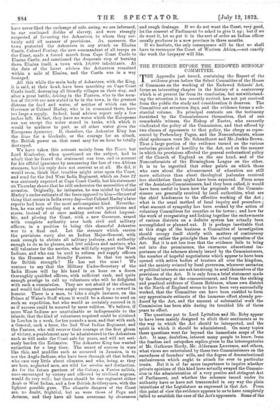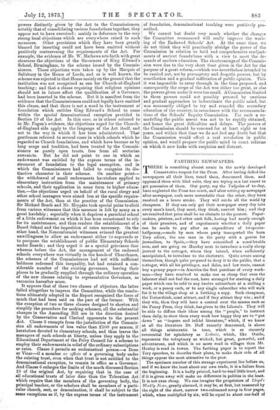THE EVIDENCE BEFORE THE ENDOWED SCHOOLS' COMMITTEE.
THE Appendix just issued, containing the Report of the evidence given before the Select Committee of the House of Commons on the working of the Endowed Schools' Act,
forms an interesting chapter in the history of a controversy which is at present far from its conclusion, but notwithstand- ing the attention it has recently excited, has not yet received from the public the study and consideration it deserves. The Committee sat seventeen days, and the evidence forms a sub- stantial volume. Its principal contents are the testimony furnished by the Commissioners themselves, that of one remarkable witness, the Bishop of Exeter, who earnestly vindicated the policy of the Commission, and that offered by two classes of opponents to that policy, the clergy as repre- sented by Prebendary Fagan, and the Nonconformists, whose chief spokesmen were Mr. Schnadhorst and Mr. Jenkin Brown. Thus a large portion of the evidence turned on the various sectarian grounds of hostility to the Act, and on the manner in which its provisions affected the general ecclesiastical policy of the Church of England on the one hand, and of the Nonconformists of the Birmingham League on the other. It is to be regretted. that other points on which those who care about the advancement of education are still more solicitous than about theological jealousies received less elucidation than might have been expected. From some of the Assistant-Commissioners, had they been called, it would. have been useful to learn how the proposals of the Commis- sioners are generally received by local authorities, what are the chief hindrances to the effective working of the Act ; what is the usual method of local inquiry and procedure ; what amount of sympathy has been evoked by the action of voluntary Committees for counties or for towns ; and how far the work of reorganising and linking together the endowments of various districts on a definite system has actually been accomplished or planned out. It is perhaps inevitable that at this stage of the business a Committee of investigation should occupy itself chiefly with matters of controversy affecting rather the principle than the actual operation of the Act. But it is not less true that the evidence fails to bring out into due prominence, the enormous educational im- portance of the schemes already issued by the Commissioners, the number of hopeful negotiations which appear to have been opened with active bodies of trustees all over the kingdom, and the anxiety evinced by local governors, wherever sectarian or political interests are not too strong, to avail themselves of the provisions of the Act. It is only from a brief statement made by the Secretary at the commencement, and from the striking and practical evidence of Canon Robinson, whose own district in the North of England seems to have been very successfully worked, that the Committee can have been enabled to form any approximate estimate of the immense effect already pro- duced by the Act, and the amount of substantial work the Commission has been able during its troubled life of three years to effect.
The questions put to Lord Lyttelton and Mr. Roby appear to have been mainly designed to elicit their sentiments as to the way in which the Act should be interpreted, and the spirit in which it should be administered. On many topics these questions went far beyond the immediate scope of the Act. It may, doubtless, interest many people to know, from the fearless and outspoken replies given to the interrogatories of Mr. Gathorne Hardy, Mr. Alderman Lawrence, and others, what views are entertained by these two Commissioners on the sacredness of founders' wills, and the degree of denominational exclusiveness which ought to attach for ever to particular trusts. But it is of far more importance to inquire whether private opinions of this kind have actually swayed the Commis- sion in the administration of a very precise and stringent Act of Parliament, and whether the schemes issued under its authority have or have not transcended in any way the plain intentions of the Legislature as expressed. in that Act. From this point of view the evidence appears to us to have completely failed to establish the case of the Act's opponents. Some of the powers distinctly given by the Act to the Commissioners, notably that of consolidating various foundations together, they appear not to have exercised ; mainly in deference to the very strong local objections which are everywhere raised to such measures. Other provisions which they have been greatly blamed for inserting could not have been omitted without positively contravening the requirements of the Act. For example, the evidence of Mr. W. Mathews sets forth with great clearness the objections of the Governors of King Edward's School, Birmingham, to the scheme issued by the Commis- sioners. Those objections were taken up by the Marquis of Salisbury in the House of Lords, and as is well known, the scheme was rejected in that House mainly on the ground that the institution was not recognised as one for Church-of-England teaching ; and that a clause requiring that religious opinions should not in future affect the qualification of a Governor, had been inserted in tire scheme. But it is manifest from the evidence that the Commissioners could not legally have omitted this clause, and that there is not a word in the instrument of foundation which entitles King Edward's School to come within the special denominational exception provided in Section 19 of the Act. In this case, as in others referred to in Mr. Fagan's evidence, the objections urged for the Church- of-England side apply to the language of the Act itself, and not to the way in which it has been administered. That gentleman referred to several cases in which schools which he regarded as Church foundations, and which have become so by long usage and tradition, had been treated by the Commis- sioners as purely open trusts, free from all sectarian restraints. But he did not point to one in which an endowment was entitled by the express terms of the in- strument of foundation to the legal exemption, and in which the Commissioners had failed to recognise its dis- tinctive character in their scheme. On another point— the withdrawal of small endowments heretofore applied to elementary instruction from the maintenance of primary schools, and their application in some form to higher educa- tion,—the objections urged on behalf of the rural clergy and other school managers were aimed less at the specific require- ments of the Act, than at the practice of the Commission. Sir Michael Beach and Mr. Heygate took special pains to elicit from various witnesses that this measure is felt by many as a great hardship ; especially when it deprives a parochial school of a little endowment on which it has been accustomed to rely for its maintenance, and thus renders the establishment of a Board School and the imposition of rates necessary. On the other hand, the Nonconformist witnesses evinced, the greatest unwillingness to allow an endowment either to supersede or to postpone the establishment of public Elementary Schools under Boards ; and they urged it as a special grievance that whereas before the Act, the management of the endowed schools everywhere was virtually in the hands of Churchmen, the schemes of the Commissioners had not with sufficient boldness redressed this inequality, but had retained a con- siderable number of the existing governors, leaving their places to be gradually supplied through the ordinary operation of the new clauses relating to representative Governors, as vacancies hereafter arose.
It appears that of these two classes of objectors, the latter failed altogether to impress the Committee, while the resolu- tions ultimately adopted in the Report recognised the force of much that had been said on the part of the former. With the exception of two or three clauses designed to shorten and simplify the procedure for making schemes, all the substantial changes in the Amending Bill are in the direction desired by the Conservative and Clerical opponents to the present Act. Clause 3 exempts from the jurisdiction of the Commis- sion all endowments of less value than £100 per annum, if heretofore devoted to elementary schools, and thus leaves the managers of such schools at liberty, unless they apply to the Educational Department of the Privy Council for a scheme to employ their endowments in relief of the ordinary subscriptions or rates. Clause 5 permits an ecclesiastical person—a Dean or Vicar—if a member ex officio of a governing body under the existing trust, even when that trust is not entitled to the denominational exception, to remain in office as a Governor. And Clause 6 enlarges the limits of the much discussed Section 19 of the original Act, by requiring that in the case of all educational trusts of later date than the Toleration Act which require that the members of the governing body, the principal teacher, or the scholars shall be members of a parti- cular church, sect, or denomination, it shall be subject to the same exceptions as if, by the express terms of the instrument of foundation, denominational teaching were positively pre- scribed.
We cannot but doubt very much whether the changes the Committee recommend will really improve the work- ing of the Endowed Schools' Act. At the same time, we do not think they will practically abridge the power of the Commission in relation to bold and comprehensive readjust- ments of ancient foundations with a view to meet the de- mands of modern education. The shortcomings of the Commis- sion were due to the very short time given in the Act for the purpose of a great reform,—which was nevertheless intended to be carried out, not by peremptory and despotic powers, but by conciliation and a gradual infiltration of public opinion. This it was impossible to carry through in the time proposed, and consequently the scope of the Act was either too great, or else the powers given under it were too small. A Commission limited to these powers could not possibly proceed by cautious and gradual approaches to indoctrinate the public mind, but was necessarily obliged to try and remodel the secondary education of the country, in accordance with the recommenda- tions of the Schools' Inquiry Commission. For such a re- modelling the public assent was not to be rapidly obtained, and hence the great difficulties and delays. The powers of the Commission should be renewed for at least eight or ten years, and within that time we do not feel any doubt but that the Commission would effect a real revolution in public opinion, and would prepare the public mind to court reforms on which it now looks with suspicion and distrust.



































 Previous page
Previous page